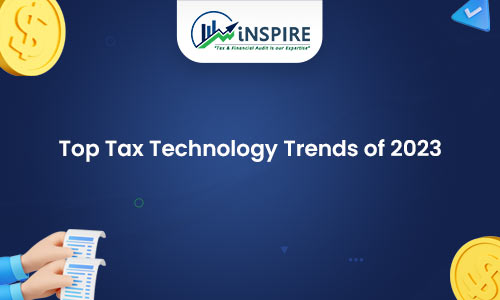
Top Tax Technology Trends of 2023
In our rapidly evolving world, staying ahead of the curve is essential in the realm of tax technology. As businesses and individuals grapple with ever-changing tax laws and regulations, the demand for efficient and effective tax solutions continues to grow. In this blog post, we'll explore the top tax technology trends of 2023 that are shaping the future of tax management. Whether you're a tax professional, a business owner, or simply someone interested in the tax landscape, these trends are worth your attention.
In our rapidly evolving world, staying ahead of the curve is essential in the realm of tax technology. As businesses and individuals grapple with ever-changing tax laws and regulations, the demand for efficient and effective tax solutions continues to grow. In this blog post, we'll explore the top tax technology trends of 2023 that are shaping the future of tax management. Whether you're a tax professional, a business owner, or simply someone interested in the tax landscape, these trends are worth your attention.
1. Artificial Intelligence and Machine Learning in Tax Compliance:
Artificial Intelligence (AI) and Machine Learning (ML) are revolutionizing tax compliance. These technologies can quickly analyze vast amounts of data to identify discrepancies and potential tax issues. AI-powered tax software can help businesses and individuals ensure they're adhering to the latest tax laws and regulations, reducing the risk of costly audits and penalties.
2. Blockchain for Transparent Tax Reporting:
Blockchain technology is gaining ground in the world of taxation. It provides a secure and transparent way to record financial transactions, making it easier for tax authorities to verify income and tax payments. Blockchain can also streamline cross-border transactions, simplifying the complex web of international tax regulations.
3. Cloud-Based Tax Solutions:
The shift to cloud-based tax solutions continues to gain momentum. Cloud technology offers flexibility, scalability, and accessibility, allowing users to access tax data and software from anywhere with an internet connection. This trend is particularly beneficial for businesses with remote workforces and multiple locations.
4. Digital Tax Portals for Enhanced Collaboration:
Tax authorities worldwide are embracing digital platforms for tax reporting and communication. Digital tax portals allow taxpayers to interact with tax authorities more efficiently, reducing the administrative burden. This trend promotes transparency and simplifies the tax compliance process.
5. Tax Data Analytics for Informed Decision-Making:
Data analytics tools are becoming indispensable for tax professionals and businesses. By analyzing historical tax data and financial information, tax experts can uncover valuable insights that inform strategic financial decisions. This trend is about using data as a strategic asset for tax planning and optimization.
6. Robotic Process Automation (RPA) for Routine Tasks:
RPA is automating repetitive and time-consuming tasks in tax compliance and reporting. This technology allows tax professionals to redirect their efforts toward more strategic and analytical tasks while ensuring accuracy and efficiency in routine processes.
7. Increased Focus on Cybersecurity:
As tax technology becomes more integrated into business operations, cybersecurity is a paramount concern. The protection of sensitive tax data from cyber threats is essential. Tax software providers are investing heavily in robust cybersecurity measures to safeguard taxpayer information.
8. Environmental, Social, and Governance (ESG) Reporting:
As ESG considerations become increasingly important for investors and stakeholders, tax technology is evolving to include ESG reporting features. Businesses are integrating tax data with their sustainability efforts to provide a comprehensive view of their financial and social impact.
9. Mobile Tax Apps for Convenience:
Mobile tax apps are gaining popularity among individual taxpayers. These apps provide a user-friendly interface for filing taxes, tracking refunds, and accessing tax-related information. They cater to the growing demand for on-the-go tax management.
10. Personalized Tax Advice with Chatbots:
Chatbots and virtual assistants are being integrated into tax software to provide personalized tax advice and guidance. These AI-driven chatbots can answer user queries, offer tax-saving tips, and assist with tax planning.
In conclusion, the world of tax technology is advancing at a rapid pace, driven by AI, blockchain, cloud computing, and a commitment to improving tax compliance and reporting processes. Staying informed about these trends can help tax professionals and businesses navigate the complex tax landscape of 2023 and beyond. Embracing these technological advancements can lead to more efficient, accurate, and compliant tax management.
As you consider your tax technology needs for the future, keep in mind that staying up-to-date with these trends is not just a matter of convenience but a strategic advantage in today's evolving tax environment.











